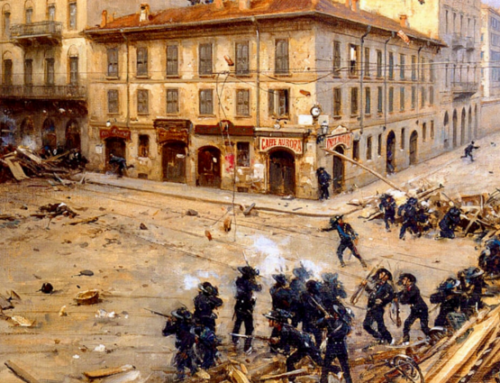Certainly, as John Willson and others have argued throughout their professional careers, one of the greatest problems of western civilization has been its attempt to balance universal truths (not necessarily limited to the transcendent and divine truths, but timeless and universal nonetheless) with particular, cultural expressions of those truths.
Throughout the history of our civilization, we tend toward one or the other. If we err toward too much universalism, we lose our proper sense of diversity or what Russell Kirk called “the principle of proliferating variety.”
If we focus too much on the particular, we become bigots, nationalists, and racists.
Our own Declaration of Independence hits the balance in a dynamic and brilliant way. The first 1/5, the most famous part, describes a universal cosmology, addressing questions of the nature of God, the nature of man, and the nature of man to God.
The specifics, it should be remembered, that is, the particular complaints of Englishmen living abroad, make up nearly 4/5 of the document in the form of the petitions of the Declaration. These deal with power and the nature of man’s relationship to man.
While each part of the Declaration is important, many scholars simply ignore the last 4/5s, the particulars, the complaints, rooted not in high theory but in immediate and particular realities. To focus on only the high ideals of the Declaration, though, negates not only the intention of the founders but also the intention and trajectory of the greatest minds of western civilization.
For a brief but glorious moment, our American founders got the balance right. Indeed, America generally did well regarding this through out its own history leading into the Civil War. Even that noble tragedy was a waging of war by particular communities for universal principles. One only has to imagine the sheer chaos of First Bull Run, each regiment dressed in its own particular colors, in the summer of 1861. Most of these regiments represented specific communities—voluntary, natural, ethnic, and otherwise.
It is well worth remembering that 94% of all union troops volunteered; the draft did not go into effect until the summer of 1863, and it never covered more than 6% of the troops.
The Civil War was as much a war of a multitude of communities fighting another multitude of communities as it was about the rights of states, the unright to hold slaves, or the freedom to free trade.
The American moment, prior to the rise of nationalism, was brief and, as with all things in this fallen world, far from perfect. The American response to the particular Indian cultures of the continent provide proof of too much universalism and not enough allowance for particularism, especially among those who had proper and previous claim to this land.
In the 1830s, President Jackson placed the needs of the universal above the particular, but the presidents of the 1850s, did much to guarantee the rights of Indians as “dependent domestic nations.” After the Civil War, however, the Republican party embraced brutalist anti-Indian policies, and the Indians, of course, were brought to the point of extinction.
Twentieth-century America was one long move (with a few hiccups) toward nationalism at home and abroad. In the beginning were the Progressives, hoping to yank the hyphen out of hyphenated Americans, hoping to lesson the growth of black, Catholic, and Jewish populations through war, abortion, recolonization, birth control and a million other horrific ways.
The liberals, more or less, became intellectually and spiritually impotent in the 1950s, and the neo-Cons, beginning in the 1960s, picked up the old Progressive agenda, though without all of the racial and religious prejudices and baggage. Indeed, nationalism demanded an end to such ethnic and religious divisions—all for the greater good of an American empire.
And, here we stand in 2012.
So many so-called and self-identified “conservatives” have so attenuated the glories of the meaning of conservatism that even men as profoundly conservative as Willson and Mike Church are uncomfortable with the term “conservative.”
For some, of course, conservatism is a way to sell things and make money; for others, conservatism is a way to show the liberals how ridiculous they can be, and to others, conservative means knocking the stuffing out of another political power in the world and remaking that land in our image.
The problems of the conservative, though, go back to the days of philosophers in ancient Greece and the Hebrew prophets. What is man? What is God? What is man’s relationship to God? What is man’s relationship to man? What is it we wish to conserve? What is it we wish to reform? And, what is it we wish to undo or let die of its own accord.
But, a few truths remain, no matter the immediacy of a problem or the word we use to define the loftier things in life. Each man is a particular being, a unique expression of an Infinite God. And, hence, the problem of balancing the universal and the particular will last as long as man walks in time, in America and not in America.
Books mentioned in this essay may be found in The Imaginative Conservative Bookstore.







Yet another fine essay from a man who causes many of us to wonder: Where does he find the time to do it all?
I have to confess I smirked a bit when you mentioned that, for some, conservatism is a way to show liberals how ridiculous they can be. Where I live, it's great sport and the game is far too abundant to resist.
With another campaign season revving up, it's important for voices such as Brad's to remind self-described conservatives what it means to be truly conservative. For many of us, it's all too easy to get caught up in the noise and drama of political life, and before we know it, victory and power become ends in themselves. An empty and meaningless liberty becomes the chief aim of our conservation.
But the political season can be a sort of Lent, compete with its own penances. Every time you see a campaign yard sign with a ridiculous canned slogan on it, read a bit of Burke or Kirk. By November you'll need glasses.
Shot glasses full of Tequila?
Thanks again to Dr. Birzer for telling the unvarnished truth!
Since Brad takes my name in somewhat less than vain, I guess I'd best weigh in. A student of mine at Saint Louis University (about a hundred years ago!) offered the opinion that conservatives were people who wanted to "prop big business up and keep Negroes down." "Negro," by the way, was the preferred term in those days. This was once quite a widespread conception, not altogether absent from today's small-minded politics. A good friend of mine from college, fifty years ago, still insists that conservatives, like me, do not care enough for "the poor." I resolved a long time ago to let such talk go; after all, I can only show my concern for the poor by cultivating a servant's heart! As a teacher, which I learned very early was my calling, I learned that history comes alive to students mostly through biography. That is, they learn to grow into men and women at least partly by comparing themselves to heroes and villains who confront those universal things that all of us have confronted since Eden. I don't know of any other solution to the dilemma that Brad so ably proposes. I do know that it is not ideology or nationalism or any other ism.